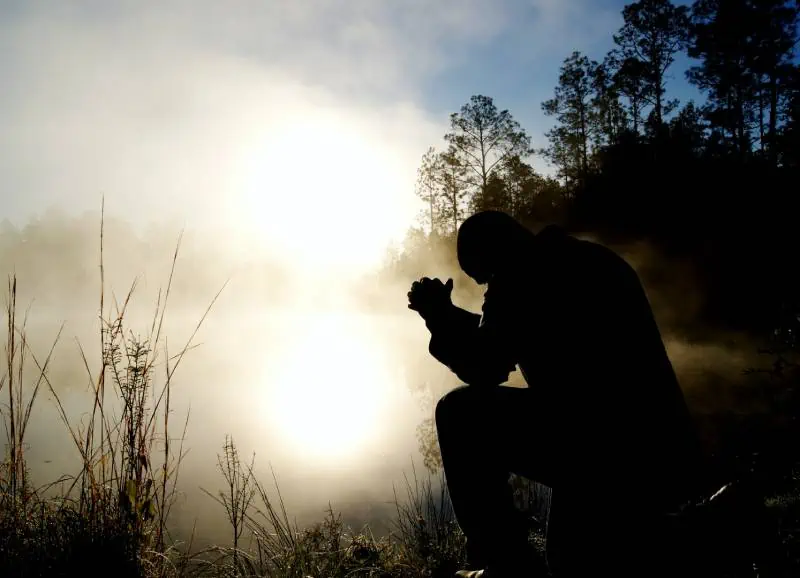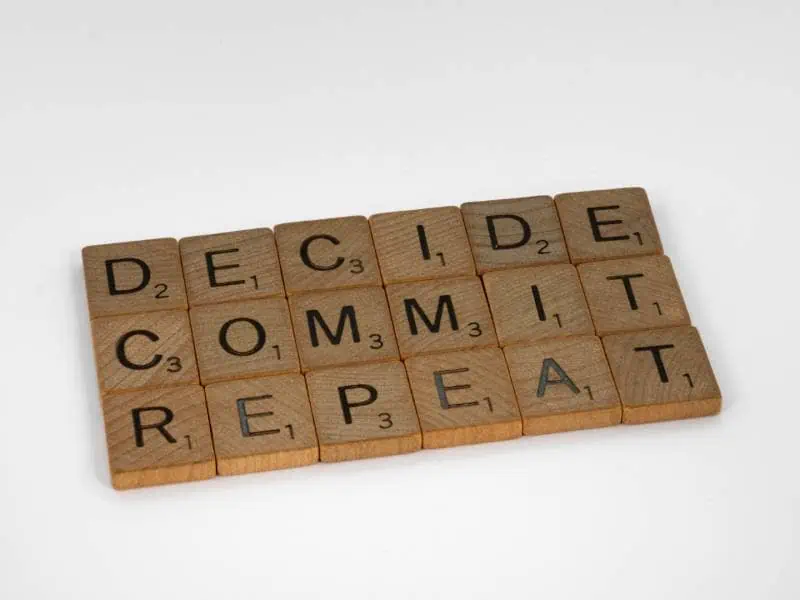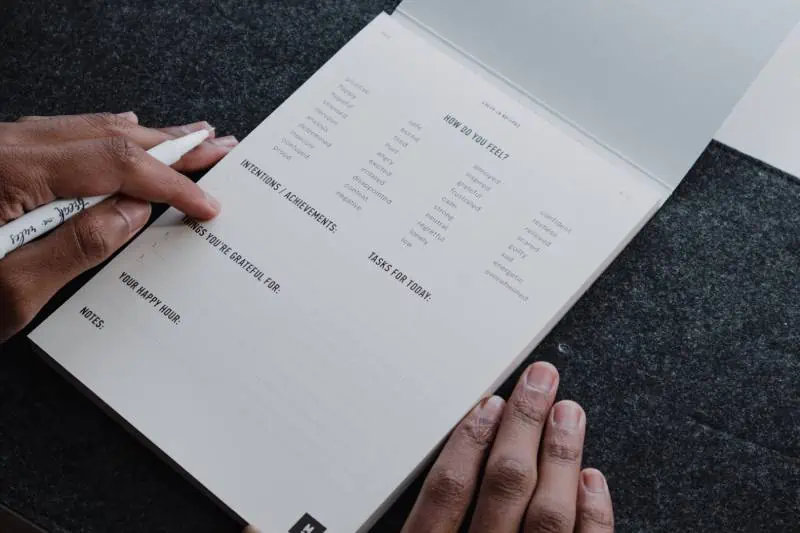In our hectic everyday lives, it’s far too easy to run around ticking things off our to-do list without thinking about the purpose behind our rushing. Spiritual practices like intention setting allow us to pause and ponder on what we are aiming for.
Setting daily intentions is a powerful practice as it enables us to go about our days with a specific focus. This, in turn, sprinkles meaning into everything we do, even the most mundane tasks.
Moreover, the intention-setting process doesn’t require much of your precious time. You can set a daily intention in less time than it takes a make your morning cuppa. So if you’ve been feeling lost and directionless or struggling to get through the days, try setting intentions.
This article will cover exactly what intentions are and how you can use this powerful tool.
Contents
What does it mean to set an intention?

In spirituality, an intention is a “Santka” or seed that helps you find an aim and purpose to live by. An intent allows you to make the right decisions and choices, as it acts as a personal compass, guiding you down the right path.
Many people assume that intentions are the same as goals, but this is not true. While similar, intent does not have a specific end result; it is more just a guideline of what you should do to become who you want to be.
You can set an intention in any area of your life, from work to relationships to health to personal growth. However, unlike setting goals, intention setting is not about declaring what material things you want to attain, like a new car.
Instead, an intention is more about a quality you want to cultivate, such as being more compassionate to others. Alternatively, it can be something you want to prioritize or intend to do more, such as self-care.
Is an intention the same as a prayer?

Intentions and prayers are similar in many ways. They are both about putting your desires out into the universe. However, intentions are something we set to ourselves; we address ourselves when setting the resolve, acknowledging that we have the power to make it happen.
Prayers, on the other hand, are addressed to a higher power. When we pray, we ask for help or guidance from a god or the universe to help us make what we are asking for a reality.
This is not to say that making an intent does not put energy out into the universe. On the contrary, the higher power can and often does assist in helping us follow our intentions even though we are having a conversation with ourselves.
What is the purpose of setting intentions?
The Buddha famously said, “the mind is everything. What you think, you become”. So taking time to mentally create our desires is essential to achieving them. We do not have to speak words for the universe to hear and act on them; thinking is enough. So, setting intentions is about harnessing the power of thought and using it to turn our ideal life into reality.
The purpose of an intention is to plant a seed or build a foundation for where we want to go. Without articulating in our mind what we desire and declaring it either mentally, vocally, or by writing, we will struggle to move forwards. Here are other benefits we get when we set an intention.
Intentions help us learn more about ourselves

The spiritual practice of setting an intention helps you connect to yourself on a deeper level and gain more clarity around your beliefs. Learning more about ourselves is a vital part of personal development; thus, intentions are a powerful tool for becoming the best version you can be.
Intentions help us cultivate mindfulness
When we take the time to set intentions, we pause the usual mental clutter of our minds and connect to the present moment. This makes setting intentions a mindfulness practice, giving us a chance to develop an awareness of our emotions, body sensations, and general mood.
Intentions help us set goals and create action plans
The clarity we gain from setting an intention helps us with goal setting. So many times, we struggle to set goals because we do not know what we truly want. So we select a goal we think we should choose rather than the one most aligned with us personally.
This is why so many people “fail” to reach their goals and give up easily because it was never something they truly desired. However, if you have clear intentions, your vision of the future is more evident, so you can better understand the end goal. Your intent then serves as the foundation for the actions you need to take to reach the goal, so it can be said that an intention is the initiation of a dream.
Intentions help us stay focused

As we can set intentions for a day or a year, they give us both short and long-term focus. By simply knowing where you are going and what you are working towards, remaining focused is much easier. This is because intentions make us feel mentally sharp, and a lack of mental clarity is the primary cause of getting distracted and struggling to focus.
What’s more, during those days or moments when you lack motivation or your attention keeps wandering, revisiting your intention could be enough to find focus again.
Intentions give us more control over our lives
Another purpose of setting intentions is to take control over your own life and steer the wheel, rather than being controlled by society or influenced by the opinions of others. When you are in touch with your most authentic self, you have control over what your life becomes.
Intentions push us out of our comfort zone

Lastly, knowing where we are going gives us the confidence to take the necessary action. If we are unsure what we want, we will likely not do anything that feels scary. However, when we are crystal clear on our desires, we are naturally more willing to task risks and push ourselves.
When should you set intentions?
We recommend making or revisiting your intentions daily. You do not have to choose a different resolution each day, but they should relate to the tasks or projects you are working on that day. Of course, you should do this at the beginning of the day, ideally before you do anything else.
In addition to daily intentions, you can set a resolution for the week or month ahead. Many people also use the new year to think about what they want from the future. Yearly intention setting allows you to ask yourself, “is how I am showing up in the present, how I need to act to get to where I want to be?”
How to create your own intention-setting ritual
So how do you get started with intention setting? Here are our top tips on creating rituals for short and long-term intentions.
Daily intention-setting ritual

You have probably heard lots of talk about the importance of having a morning routine. Morning routines help us set the tone for the day and prepare ourselves in the best possible way. In addition, when we have a morning routine, we feel more motivated and productive and can handle stressors better.
A daily intention-setting ritual is a short and simple thing that anyone can do each morning, no matter how pressed for time you are.
To set your daily intention:
- Take a moment to enter a meditative state.
- Sit in a comfortable position and close your eyes.
- Take a few deep breaths, and then spend a minute or so following your natural breath until you feel your mind starts to settle. You may also find placing one hand over your heart helpful for getting a sense of what you want to achieve or feel that day.
- Ask yourself, “what quality or energy do I need to have the best day possible?” Or, “what do I need to focus on right now?” Don’t overthink it; listen to the first words and choose the one most resonating with you. For example, the word success might come up if you are in the middle of launching a business. Alternatively, the word peace might arise if you are particularly stressed or overwhelmed.
- Next, write it down. We recommend writing your resolves each day in an intention journal.
Weekly and monthly-intention setting ritual

Setting your intention for the week or month is a more in-depth process. Before deciding what you intend for the coming month or week, reflect on the previous one.
So spend time reviewing the past week/month, including your wins and challenges. Record any lessons that came up as these can help you craft a new or revised resolve.
Once you have reviewed the last week/month, turn your focus to the upcoming one. Ask yourself:
- What is my number one priority?
- What quality do I need to cultivate?
- What is my main focus for the upcoming week/month?
- What do I need to do more of?
Self-reflection questions like this are the best way to craft the most powerful intention possible.
Yearly intention-setting ritual

Setting a yearly intention is vital to an annual review and plan. The process is similar to the weekly and monthly ritual but more comprehensive. Set aside at least a couple of hours for your yearly session. Choose a day when you do not have too much on your plate and are unlikely to be disturbed.
Some questions you can ask as you set intentions for the year are:
- What are the main things I want to achieve this year?
- Where do I want to be at the end of the year?
- What type of person do I want to be by the year-end?
- What do I need to focus on this year to achieve my big goals?
- What quality or energy do I need to possess to live in alignment with my purpose?
You might choose to set one resolution that encompasses all areas of your life, such as hope. Or you might decide to develop one for each sector, such as to cultivate more balance in your work life.
Final thoughts on intention setting
Setting clear intentions can be both a spiritual and self-care practice, allowing you to pause from your hectic life and connect within. When you set intentions, you cultivate a sharper mindset to stay focused for longer. What’s more, the power of setting intents will help you “co-create” with the universe and opens you up to endless possibilities.


